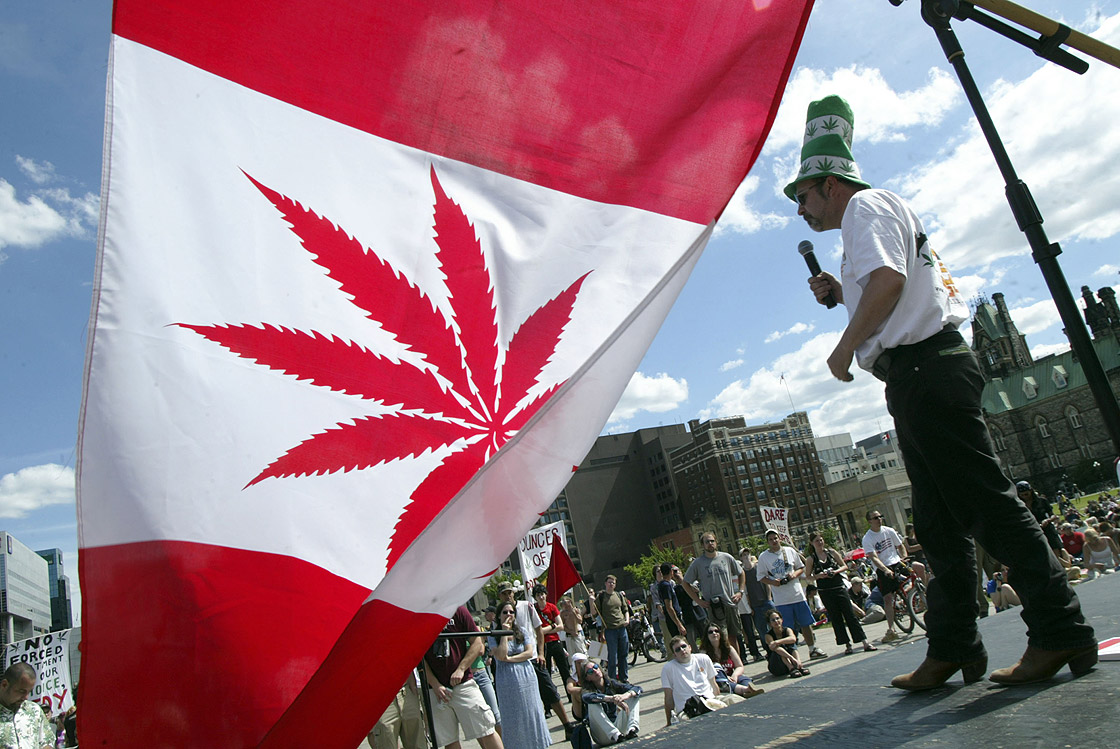TORONTO – Washington and Colorado became the first states in America to open the door to marijuana enthusiasts on Tuesday night as both states voted in favour of propositions to allow the recreational use of the drug.

Now some people are asking if this could lead to legalization of marijuana in Canada?
“They voted to legalize non-medical use of cannabis, or recreational use of cannabis, and that’s a good thing for freedom and for Canada as well,” said Neev Tapiero, a marijuana activist and representative of the Toronto-based organization Cannabis As Living Medicine (CALM). “The global drug war is a total failure, so having larger cracks in the war on drugs helps end the war on drugs which really is a bad social policy.”
Both states legalized the recreational use of marijuana, however the drug is still prohibited by federal law in the United States of America.
The drug is also prohibited by federal law in Canada though the laws are much more lax than those of the United States and possession often goes unpunished.
The Canadian population also seems much more favourable than Americans to legalization.
While the ballot measures to legalize marijuana were successful in Colorado and Washington, similar efforts failed in several other states.
However, a 2012 Forum Research poll claimed that the majority of Canadians – 66 per cent – were in favour of legalizing the drug.
Support for legalization was highest in British Columbia with 73 per cent of respondents in favour of legalizing marijuana use, according to the poll .
The legalization could also be viewed as an experiment that Canadian policy makers can learn from.

Get daily National news
“So it may be that one has to acknowledge that the so-called war on drugs has failed. It hasn’t kept drugs out of the community but has channelled them into the least desirable settings,” Bernard Dickens, a legal expert at the University of Toronto said. “If on the other hand you believe in the governmental system that has to maintain control over something that presents theoretical problems then it may be that no lesson will be learned from Washington State or Colorado anymore than anything was learned from the prohibition of alcohol in the 1920s and 30s.”
Federal political parties have widely differing views on legalizing the drug.
While Tuesday was election day in the U.S., it was also the day that drug measures in the Conservative government’s omnibus Safe Streets and Communities Act, passed last spring, came into full force and effect.
Canada’s new law provides a mandatory six-month jail term for growing as few as six marijuana plants, twice the mandatory minimum for luring a child to watch pornography or exposing oneself on a playground.
“Today our message is clear that if you are in the business of producing, importing or exporting of drugs, you’ll now face jail time,” Justice Minister Rob Nicholson said in a release Tuesday, well before the American polls closed.
Nicholson was not available Wednesday to comment on the American state votes but his spokeswoman reiterated in an email that “our government does not support the decriminalization or the legalization of marijuana.”
Julie Di Mambro added that “the production and trafficking of illicit drugs is one of the single most significant sources of money for gangs and organized crime in Canada.”
Prime Minister Stephen Harper, speaking at a press conference during his trip to India on Thursday, gave little hope to those hoping the drug may be legalized.
“I won’t speculate about what it means south if the border But the government of Canada has no intention of opening the issue here,” Harper said.
The Official Opposition New Democrats, led by Thomas Mulcair, support the decriminalization – though not legalization of marijuana – in Canada.
The Liberal Party, led by Interim Leader Bob Rae, has come out in favour of legalizing use of the plant.
Dickens claims that policymakers can look to Colorado and Washington State as experiments.
If the governments in Colorado and Washington have rational routes of access to the drug he says, than there likely will not be a spike in organized crime in Canada as drug dealers north of the border look for a more friendly market but instead could contribute to economic growth in Colorado.
“If you’re dealing with the population at large, then we’ve just seen the populations in Washington and Colorado recognizing that the recreational use of marijuana is something that can be accommodated,” Dickens said.
Tapiero agrees with Dickens and claims that legalizing marijuana can be a boon to the economy and should be a legal market.
“If you sell marijuana, you should pay your taxes, it should be regulated for health and quality and it just makes sense,” Tapiero said. “You know, normal Canadians use cannabis and it’s not a criminal activity.”
Toronto police though say that the use of marijuana – specifically grow ops- can be a danger not only to those involved but to the people surrounding the grow-op.
With a file from The Canadian Press








Comments